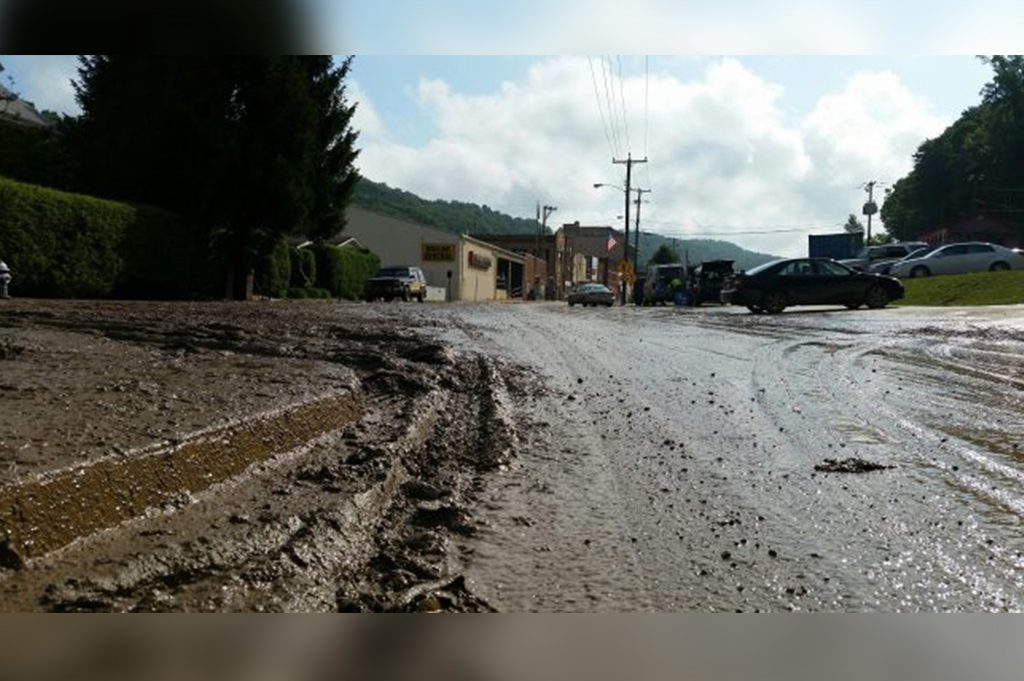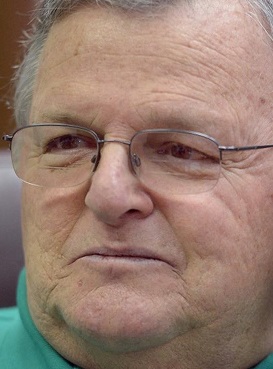Clendenin’s main street as it looked two days after the flood. Shauna Johnson/WVMetroNews.com
By: Brad McElhinny | Posted: May 29, 2018 | Source: WV MetroNews
CHARLESTON, W.Va. — Jack Lipphardt, director of West Virginia United Methodist Disaster Recovery, is frustrated by the pace of long-term flood recovery.
In mid-May, Lipphardt wrote a letter to Sen. Joe Manchin’s office, asking for assistance.
“I write to seek your help in moving WV RISE from its stagnant dormancy to the promises made to The United Methodist Church, partner ecumenical and secular bodies, funding partners, volunteer work team partners and especially to survivors of the disaster,” Lipphardt wrote.
The letter was sent right before it became public that Gov. Jim Justice’s administration had paused a contract with a consultant tasked with managing federal flood relief dollars. The administration was concerned the contract, worth up to $17 million, hadn’t gotten appropriate oversight.
But Lipphardt, like other close observers of West Virginia’s flood relief effort, says the flow of federal relief spending was slow even before that.
“We were told the first homes would be under construction in August of 2017. Then September. Then October,” Lipphardt wrote to Manchin.
By Feb. 5 this year, Lipphardt wrote, concerned groups gathered at the Clay County Courthouse. Concerns were raised about delays and “requirements that make no sense given West Virginia’s sociology and geography.”
At that meeting, he said, a representative of the West Virginia Development Office assured everyone that 50 houses would soon be under construction.
Lipphardt concluded, “To date, not one house has been constructed. Not one house has had construction to begin. Two mobile homes have been placed but neither are set up nor yet habitable.”
Lipphardt letter to Senator Joe Manchin
Contacted this Tuesday, Lipphardt said his concerns haven’t abated.
“We’ve been frustrated with them for quite some time,” he said. “We were excited a year ago.”
RISE West Virginia, in an official action plan and elsewhere, said it would assist up to 1,200 moderate- and low-income homeowners.
West Virginia had almost $150 million to put toward long-term recovery. The money was in the form of Community Development Block Grants for disaster recovery through the U.S. Department of Housing and Urban Development.
That money is also meant to help West Virginia’s business and infrastructure rebuild over the long haul.
The official kickoff for RISE was last Aug. 2. “The funds from the RISE program will help West Virginians get back on their feet and on the path to recovery,” Governor Justice stated in a news release announcing the start of the program.
But more time passed.
West Virginia made its request to start using the money this past Jan. 29. HUD gave its OK on Feb. 20.
“The delays just kept coming, people tangled up in red tape,” Lipphardt said.
“It’s a real frustration. The clients are upset and angry. People like us with the United Methodist Church and others are really bothered by this.”
West Virginia is listed as a “slow spender” in the most recent grant financial report Housing and Urban Development.
That designation means spending less than 10 percent of monthly pace required to fully use the grant by target closeout date.
Of the $149,875,000 West Virginia has available, the state still has $148,736,333 left on hand.
The perceived availability of millions in federal dollars has meant that nonprofits avoided spending money that could instead be used elsewhere, Lipphardt said.
“We’ve been told ‘Don’t spend your money on things that RISE can take care of,’ but the result is, people are stuck,” he said.
Many of those who have applied have gotten tripped up by federal regulations, he said.
RISE has a 166-page guide to policies and procedures.
“I don’t know where the brokenness is, but obviously something is broken,” Lipphardt said.
The Department of Commerce manages the RISE West Virginia disaster recovery program through the West Virginia Development Office and West Virginia Community Advancement and Development Office.
The Department of Commerce has not yet responded to emerging complaints that progress has been slow.
Lipphardt suggests a point person who reports directly to the governor might be more effective: “Somebody who would walk into the governor’s office with muddy boots and say ‘Here’s what we’ve got to do to make this happen.’”
Delegate Roger Hanshaw, R-Clay, is one of the co-chairmen of a legislative committee meant to examine flood relief and prevention in West Virginia.
Hanshaw, too, has expressed frustrations about the pace of long-term relief.
“We’ve had duplication of services, we’ve had miscommunication, we’ve had breakdown of communication,” Hanshaw said today on MetroNews’ “Talkline.”
Hanshaw said West Virginia’s first response to the flood was good.
“But then there’s the second line of response, and that’s the response that goes on when the flood water goes down… and that’s where the real breakdown has been,” he said.
Flooding happens so often in West Virginia, the state has to get better at response, he said.
“Mistakes will happen. There will be breakdowns. That’s just the nature of a natural disaster,” he said. “Once the immediate urgency fades, we’ve got to get this stuff right. Paperwork glitches and administrative nightmares shouldn’t keep people from returning to normalcy.”
WV State Delegate Roger Hanshaw (R-Clay) joins @HoppyKercheval to talk about the ongoing issues with flood recovery. WATCH: https://t.co/wkudfIRZCB pic.twitter.com/kLv6OGgdu1
— MetroNews (@WVMetroNews) May 29, 2018
 Brad McElhinny is the statewide correspondent for MetroNews. Brad is a Parkersburg native who spent more than 20 years at the Charleston Daily Mail. Contact him at brad.mcelhinny@wvmetronews.com or on Twitter @BradMcElhinny.
Brad McElhinny is the statewide correspondent for MetroNews. Brad is a Parkersburg native who spent more than 20 years at the Charleston Daily Mail. Contact him at brad.mcelhinny@wvmetronews.com or on Twitter @BradMcElhinny.











